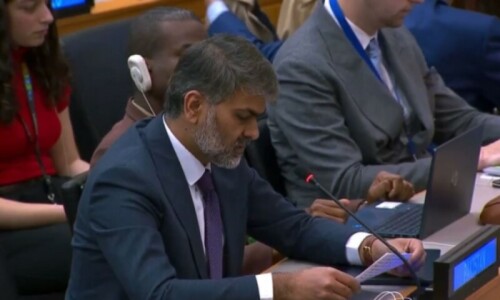
DESPITE all the protests, walkouts and boycotts by the opposition, the National Assembly has passed the federal budget for the next financial year. There was hardly any doubt about the ritualistic passage of the budget as we have been witnessing year after year. The budget debate spanned 12 days which precisely matched the 15-year average and consumed about 37 hours, slightly higher than the average of 34 hours. Both the duration and the time spent on the budget debate are among the lowest in the world.
While the duration of the budget session needs to be increased and parliamentary committees must also play a significant role in scrutinising the budget, there are some other aspects of the process which need careful attention. The most disturbing aspect is the unlimited powers of the executive to alter the budget after it is passed.
On May 29, this newspaper carried a well-researched report about the ‘supplementary budget’ amounting to Rs310.5 billion which was either re-appropriated (shifted from one — approved — head to another) or spent in excess of the budget 2016-17 passed by the National Assembly in June 2016. The finance minister sought ex post facto approval of the Assembly for these supplementary demands for grants, and as the amount has already been spent, the Assembly hardly has a choice in the matter except to approve the supplementary budget.
This was not something unique to this year alone; supplementary budgets have always been an integral part of the budget process. These grants were meant, in the words of the finance ministry, “to provide for expenditure for purposes that were not foreseen at the time of finalisation of grants”. But, as the Dawn research revealed, these supplementary grants covered such expenses as increased subsidies, discretionary grants by the prime minister, lawyers’ fees for international arbitration, purchase of vehicles, holding of the Saarc summit, the prime minister’s publicity campaigns and grants to various sports federations. Also included in the supplementary budget were such large sums as Rs22.5bn for the prime minister’s development schemes for parliamentarians!
The executive’s unlimited powers to alter the budget after it is passed must be curtailed.
Most of these expenses could have been reasonably anticipated when the original budget was passed and included at that time with reasonable accuracy. However, since a handy tool was available to play with the approved budget and because it would enable even the nominal scrutiny which parliament carries out during the budget debate to be avoided by including the expenses in the supplementary budget, government after government has used the tool of supplementary grants without restraint.
Governments in Pakistan derive their power to alter the budget approved by the Assembly from Article 84 of the Constitution by interpreting it in the most liberal and expansive manner.
This article, ‘Supplementary and Excess Grants’, states that “If in respect of any financial year it is found (a) that the amount authorised to be expended for a particular service for the current financial year is insufficient, or that a need has arisen for expenditure upon new service not included in the annual budget statement for that year; (b) that any money has been spent on any service during a financial year in excess of the amount granted for that service for that year; the federal government shall have power to authorise expenditure from the Federal Consolidated Fund, whether the expenditure is charged by the Constitution upon the fund or not, and shall cause to be laid before the National Assembly a supplementary budget statement or, as the case may be, an excess budget statement, setting out the amount of that expenditure, and the provisions of Articles 80 to 83 shall apply to those statements as they apply to the annual budget statement”.
As one can see, Article 84 does not set a deadline or a time frame for submitting the supplementary budget; the governments, therefore, do that as late as it is possible which is with the next year’s budget.
This practice has not gone unnoticed by the superior judiciary. The Supreme Court, in its judgement of Dec 5, 2013 while examining the alterations made in the budget for 2012-13 by the outgoing government of then prime minister Raja Pervaiz Ashraf just before the next election, held that “the amounts as approved in the budget passed by the National Assembly have to be utilised for the purpose specified in the budget statement. Any re-appropriation of funds or their utilisation for some other purpose, though within the permissible limits of the budget, are not justified…”
The court also referred to the government’s financial rules and inferred that one of them “indicates that in the case of supplementary grants, the assent of the National Assembly is to be obtained before these funds are made available”.
The continuing practice of placing the supplementary budgets before the Assembly after the expenses have been incurred is apparently in violation of at least the spirit of the Supreme Court judgement. In order to stop the unbridled practice of seeking ex post facto approval of the supplementary grants, either a clearer direction by the court may be sought or the court may take notice on its own to give a clear direction.
A better solution, however, may be that parliament passes an act to regulate the budget process as envisaged in Article 79 of the Constitution which states: “…and all matters connected with or ancillary to the matters aforesaid shall be regulated by act of Majlis-i-Shoora (parliament) or, until provision in that behalf is so made, by rules made by the president”.
Even 44 years after the passage of 1973 Constitution, the budget process continues to be regulated by rules made by the president. It is time parliament passed an act to regulate the budget process and made it mandatory to seek the approval of the National Assembly prior to altering the approved budget.
The writer is president of Pildat, a Pakistani public policy think tank.
Twitter: @ABMPildat
Published in Dawn, June 20th, 2017












































